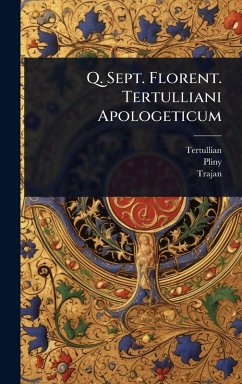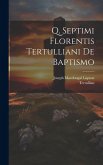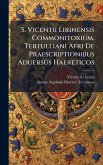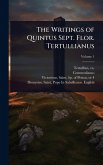This is an 1865 edition of Q. Sept. Florent. Tertulliani's "Apologeticum," prepared for scholarly use. The volume includes variations of the text, letters between Pliny and Trajan concerning the Christians, and a fragment of Tertullianâ(TM)s Apologeticum from the Fulda Codex. Tertullian's "Apologeticum" is a key text in early Christian apologetics, defending Christianity against accusations and misconceptions prevalent in the Roman Empire. The correspondence between Pliny and Trajan offers valuable insights into the Roman government's policies towards Christians during this period. This edition provides a valuable resource for students and scholars interested in early Christian history and Roman legal history. This work has been selected by scholars as being culturally important, and is part of the knowledge base of civilization as we know it. This work was reproduced from the original artifact, and remains as true to the original work as possible. Therefore, you will see the original copyright references, library stamps (as most of these works have been housed in our most important libraries around the world), and other notations in the work. This work is in the public domain in the United States of America, and possibly other nations. Within the United States, you may freely copy and distribute this work, as no entity (individual or corporate) has a copyright on the body of the work. As a reproduction of a historical artifact, this work may contain missing or blurred pages, poor pictures, errant marks, etc. Scholars believe, and we concur, that this work is important enough to be preserved, reproduced, and made generally available to the public. We appreciate your support of the preservation process, and thank you for being an important part of keeping this knowledge alive and relevant.
Bitte wählen Sie Ihr Anliegen aus.
Rechnungen
Retourenschein anfordern
Bestellstatus
Storno





![Fasciculus Rerum GrÃ]carum Ecclesiasticarum Exhibens Tractatum Basilii Magni De Synisactis, Nicephori Callisti ... Sermonem In S. Mar. Magdalenam Cura Et Studio A.m. Bandini... Fasciculus Rerum GrÃ]carum Ecclesiasticarum Exhibens Tractatum Basilii Magni De Synisactis, Nicephori Callisti ... Sermonem In S. Mar. Magdalenam Cura Et Studio A.m. Bandini...](https://bilder.buecher.de/produkte/74/74536/74536795m.jpg)

![The Writings of Quintus Sept. Flor. Tertullianus: [with the Extant Works of Victorinus and Commodianus]; Volume 2 The Writings of Quintus Sept. Flor. Tertullianus: [with the Extant Works of Victorinus and Commodianus]; Volume 2](https://bilder.buecher.de/produkte/71/71724/71724166m.jpg)
